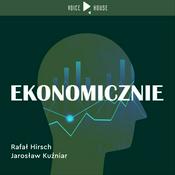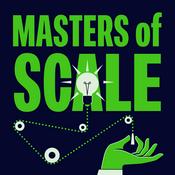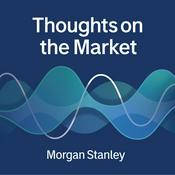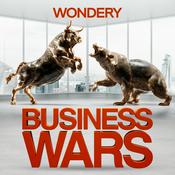The Rational Reminder Podcast
Benjamin Felix, Cameron Passmore, and Dan Bortolotti
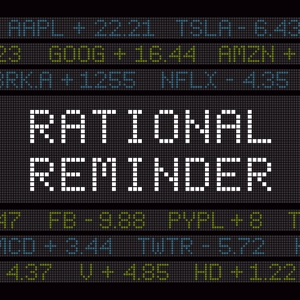
Najnowszy odcinek
415 odcinków
- What if financial planning were approached the same way engineers design aircraft, medical treatments, or complex systems—with clearly defined objectives, constraints, and rigorous trade-off analysis? In this episode, Benjamin Felix is joined by Braden Warwick for a deep dive into what it means to engineer financial outcomes. Drawing on Braden's background as a PhD-trained mechanical engineer and his work building financial planning software at PWL Capital, the conversation reframes financial planning as a design problem rather than a speculative exercise. They explore the critical distinction between a financial plan and a financial projection, why uncertainty does not invalidate good planning, and how professional communication under uncertainty can build trust with clients—especially those from technical backgrounds. The discussion highlights the importance of goals-based planning, sensitivity analysis, and explicitly quantifying trade-offs when clients have multiple competing objectives.
Key Points From This Episode:
(0:00:04) Introduction to Episode 393 and the return of Braden Warwick
(0:02:50) Braden's role at PWL and his experience deploying Conquest Planning software
(0:05:46) The tension between low industry entry barriers and professional standards in financial planning
(0:07:54) Braden's background in mechanical engineering and academia
0:09:33) Financial plans vs. financial projections: why uncertainty doesn't make a plan "wrong"
(0:12:59) Lessons from medicine and engineering on communicating decisions under uncertainty
(0:15:15) An engineering framework for financial planning: objectives first, then solutions
(0:18:42) Why surface-level goals like "minimize tax" or "maximize returns" often miss what really matters
(0:21:19) Evaluating plans against goals using projections, scenario analysis, and sensitivity analysis
(0:24:28) Why sensitivity analysis helps planners focus on what actually drives outcomes
(0:29:27) Handling multiple competing goals using trade-off analysis and Pareto frontiers
(0:36:46) Practical ways planners can present trade-offs without complex math
(0:39:25) Case study setup: professional financial planning with corporate clients
(0:40:20) Salary vs. dividends for business owners when optimizing for legacy goals
(0:44:26) Why financial planning software outputs can be misleading without context
(0:48:23) The importance of understanding how planning software calculates key metrics
(0:50:22) Using PWL's free retirement tool to analyze CPP and OAS timing decisions
(0:53:44) Approximating Monte Carlo outcomes using standard error of the mean
(0:56:16) Linking "bad" and "terrible" outcomes to plan success probabilities
(0:58:44) How CPP and OAS deferral affects sustainable spending and downside protection
(1:02:46) What makes PWL's CPP calculator different from typical break-even tools
(1:05:15) Why wage inflation assumptions materially affect CPP deferral decisions
(1:07:46) Closing framework: goals, constraints, sensitivity analysis, and quantified trade-offs
(1:09:36) Financial planning as an emerging discipline rooted in engineering-style thinking
Links From Today's Episode:
Meet with PWL Capital: https://calendly.com/d/3vm-t2j-h3p
Rational Reminder on iTunes — https://itunes.apple.com/ca/podcast/the-rational-reminder-podcast/id1426530582.
Rational Reminder on Instagram — https://www.instagram.com/rationalreminder/
Rational Reminder on YouTube — https://www.youtube.com/channel/
Benjamin Felix — https://pwlcapital.com/our-team/
Benjamin on X — https://x.com/benjaminwfelix
Benjamin on LinkedIn — https://www.linkedin.com/in/benjaminwfelix/
Editing and post-production work for this episode was provided by The Podcast Consultant (https://thepodcastconsultant.com) - ETFs were once almost synonymous with low-cost, sensible investing. But that era is changing fast. In this episode, Ben Felix, Dan Bortolotti, and Ben Wilson introduce and unpack the concept of "ETF slop"—the explosion of complex, high-fee, behaviorally engineered ETFs that are designed to attract assets rather than improve investor outcomes. The trio traces how ETFs evolved from simple index-building tools into wrappers for increasingly speculative strategies. They discuss how the ETF "halo effect" can mislead investors into equating structure with quality, and why innovation in financial products often benefits manufacturers more than end investors. From thematic hype to downside "protection" that isn't what it seems, the episode offers a clear framework for thinking critically about modern ETF offerings.
Key Points From This Episode:
(0:00:04) Introduction to the Rational Reminder Podcast and the hosts.
(0:00:39) Ben introduces the idea of "ETF slop" and why ETFs are no longer synonymous with sensible investing.
(2:20) More actively managed ETFs now exist than index-tracking ETFs in the U.S.
(3:30) ETFs increasingly engineered to attract assets rather than improve investor outcomes.
(4:04) Record ETF launches in 2025: over 1,000 in the U.S. and 300+ in Canada.
(6:43) Average management fees on newly launched ETFs rival traditional active mutual funds.
(7:47) The ETF "halo effect" and why structure is mistaken for quality.
(10:31) What an ETF actually is—and why it's just a wrapper for a strategy.
(11:13) The first ETF was launched in Canada and still exists today.
(14:40) ETFs as tools for speculation versus long-term investing.
(17:08) Evidence that simpler allocation funds reduce harmful investor behavior.
(20:35) Why too much product choice can make good investing harder.
(21:40) Four categories of ETF slop introduced: thematic, buffer, covered call, and single-stock ETFs.
(22:16) Why thematic ETFs appeal to optimism and extrapolation bias.
(24:04) Evidence that most thematic ETFs underperform after launch.
(26:25) Morningstar data: almost no thematic ETFs outperform over long horizons.
(28:55) Why exciting narratives don't translate into superior returns.
(31:25) Buffer ETFs explained: capped upside with partial downside protection.
(34:31) Research showing high fees, high costs, and inconsistent protection.
(38:16) Why simple stock/bond mixes dominate buffer ETFs even in drawdowns.
(42:53) Covered calls: high income today, lower total returns tomorrow.
(45:48) Why covered call ETFs systematically underperform their underlying assets.
(47:38) Income needs can be met more efficiently without covered calls.
(48:19) The cult-like following driven by double-digit yield marketing.
(49:57) Single-stock ETFs as the "sloppiest" form of ETF slop.
(53:44) Leveraged and inverse ETFs magnify volatility and complexity.
(56:20) Research showing massive underperformance versus simple benchmarks.
(58:56) Why these products resemble speculation more than investing.
(1:03:35) Complexity in investment products is strongly linked to poor outcomes.
(1:05:48) John Bogle's warning: beware of new and "hot" investment products.
(1:06:48) Why ETFs are powerful tools—but only when used correctly.
Links From Today's Episode:
Meet with PWL Capital: https://calendly.com/d/3vm-t2j-h3p
Rational Reminder on iTunes — https://itunes.apple.com/ca/podcast/the-rational-reminder-podcast/id1426530582.
Rational Reminder on Instagram — https://www.instagram.com/rationalreminder/
Rational Reminder on YouTube — https://www.youtube.com/channel/
Benjamin Felix — https://pwlcapital.com/our-team/
Benjamin on X — https://x.com/benjaminwfelix
Benjamin on LinkedIn — https://www.linkedin.com/in/benjaminwfelix/
Cameron Passmore — https://pwlcapital.com/our-team/
Cameron on X — https://x.com/CameronPassmore
Cameron on LinkedIn — https://www.linkedin.com/in/cameronpassmore/
Ben Wilson on LinkedIn — https://www.linkedin.com/in/ben-wilson/
Editing and post-production work for this episode was provided by The Podcast Consultant (https://thepodcastconsultant.com) - Financial planning is built on assumptions — about markets, inflation, longevity, human behaviour, and even the questions clients bring into the room. In this episode, Ben and Braden welcome a diverse panel that originally came together at the FP Canada Conference to explore how those assumptions influence planning outcomes in practice. Joining them are Adam Chapman, a retirement-focused planner who helps clients turn their money into memories; Joe Nunes, an actuary with decades of pension and longevity experience; and Aaron Theilade, Director of Continuing Education at FP Canada. Together, the panel unpacks how to make assumptions credible, how to stress-test them, how to navigate client bias, and how planners can blend math with humanity to create better client outcomes.
Key Points From This Episode:
(0:00:04) Why this episode: recreating a conference panel on planning assumptions.
(0:01:03) Braden on the panel's value for planners and DIY investors.
(0:02:32) Meet the guests: Adam, Joe, Aaron, and Braden.
(0:06:04) Assumptions matter: directional accuracy > prediction.
(0:07:47) Actuarial view: start with inflation, bond yields, and risk capacity.
(0:09:38) Engineering mindset: plan for expected and unexpected outcomes.
(0:13:21) Client pushback: longevity surprises and hidden assumptions.
(0:16:59) Asset allocation: strategic, goal-based, informed by behaviour.
(0:20:57) Software limits: life is too variable for perfect modeling.
(0:22:01) Behaviour gap: retirees spend less over time despite inflation.
(0:25:18) Software guides; planners interpret and humanize outputs.
(0:28:48) Use assumptions based on the specific question (e.g., withdrawals).
(0:30:31) Always ask: "Why are we modeling this?"
(0:34:15) Handling bias: reframe assumptions to reveal inconsistencies.
(0:38:19) Assumptions evolve: returns, spending, and research all change.
(0:42:38) Longevity beliefs: explore "why," not just the data.
(0:50:38) Core truth: every plan is wrong — planning is iterative.
(0:52:20) When to update: depends on age, goals, and material changes.
(0:57:23) PWL approach: twice-yearly updates + adjustments during extremes.
(1:00:03) Tips: focus on behaviour, communication, goals, and integration.
(1:10:02) Success: relationships, impact, freedom, and sharing knowledge.
Links From Today's Episode:
Meet with PWL Capital: https://calendly.com/d/3vm-t2j-h3p
Rational Reminder on iTunes — https://itunes.apple.com/ca/podcast/the-rational-reminder-podcast/id1426530582.
Rational Reminder on Instagram — https://www.instagram.com/rationalreminder/
Rational Reminder on YouTube — https://www.youtube.com/channel/
Benjamin Felix — https://pwlcapital.com/our-team/
Benjamin on X — https://x.com/benjaminwfelix
Benjamin on LinkedIn — https://www.linkedin.com/in/benjaminwfelix/
Editing and post-production work for this episode was provided by The Podcast Consultant (https://thepodcastconsultant.com) - In this first episode of 2026, we sit down for a deep dive into one of the hottest concerns coming from clients and listeners lately: Is the U.S. stock market dangerously concentrated—and are we in an AI bubble? Ben, Dan, and Ben unpack the data, the history, and the psychology behind today's valuations, drawing lessons from past episodes of market euphoria such as Nortel in Canada, the dot-com boom, and Japan's 1989 peak. They explain why high market valuations—not concentration—pose the bigger challenge, how bubbles historically fuel real economic innovation while hurting investors, and why diversification continues to offer the only reliable protection against unknowable futures. Along the way, they revisit examples of how value stocks, small-cap value, and global diversification have fared across different market regimes.
Key Points From This Episode:
(0:00:40) What RR is about: evidence-based insights, synthesis episodes, expert interviews, and long-form inquiry — not debates.
(0:04:20) Why listeners value RR: transparency, friendly inquiry, returning to topics over time, and the hosts' dynamic.
(0:09:25) Rising concern: clients asking whether U.S. market concentration and an AI bubble mean it's time to exit stocks.
(0:11:10) Advisors echo similar worries: U.S. politics, all-time highs, and emotional decision-making.
(0:14:20) Today's data point: Top seven U.S. stocks = 36% of S&P 500; 32% of the total U.S. market — highest on record.
(0:16:10) Why people fear concentration: a decline in the Magnificent Seven could meaningfully drag down the index.
(0:17:30) Canada's cautionary tale: Nortel once hit 36% of the TSX — collapsed to zero — but the market recovered by 2005.
(0:21:20) Bubbles through history: canals, railways, fiber optics, dot-coms — innovation funded by speculation.
(0:25:30) Dot-com parallels: huge ideas, low cost of capital, lots of failures — but lasting infrastructure remained.
(0:28:40) AI dominance: Since ChatGPT, AI-linked companies drove 75% of S&P returns, 80% of earnings growth, 90% of capex.
(0:31:15) Reminder: No bubble calls — just context. High prices don't equal an inevitable crash.
(0:33:10) Concentration vs. valuation: concentration shows weak links to future returns; valuations matter far more.
(0:35:05) Market timing trap: U.S. valuations were high in 2021 — selling then would have been disastrous.
(0:36:40) The U.S. lost decade: 2000–2010 returns were flat; in CAD, recovery didn't happen until 2013.
(0:38:55) Value stocks held up: U.S. value and small-cap value delivered positive returns while broad indexes stagnated.
(0:41:00) Recency bias reminder: Canadians once avoided U.S. stocks entirely after a decade of underperformance.
(0:44:05) Japan 1989: World's largest market crashes — still not recovered in real terms 36 years later.
(0:47:10) Global diversification wins: A 40% Japan-weighted global portfolio still performed fine thanks to U.S. growth.
(0:49:00) Cross-country data: Many markets are far more concentrated than the U.S. — still delivered solid returns.
(0:52:30) Valuation evidence: Higher CAPE = lower future returns — economically strong pattern across countries.
(0:55:40) Core lesson: Diversification + discipline. You will always hold winners and losers — that's the point.
(0:57:55) Practical ways to lower concentration risk: global equity funds, small caps, and Canada's 10% cap rule.
(1:00:30) Why active managers don't help: only ~30–47% outperform depending on concentration trend.
(1:03:25) Final takeaway: high valuations may imply lower returns, but prediction is impossible — stay diversified.
(1:05:15) After-show review: Addressing a one-star critique ("Fartcoin Designer") with humour and community context.
Links From Today's Episode:
Meet with PWL Capital: https://calendly.com/d/3vm-t2j-h3p
Rational Reminder on iTunes — https://itunes.apple.com/ca/podcast/the-rational-reminder-podcast/id1426530582.
Rational Reminder on Instagram — https://www.instagram.com/rationalreminder/
Rational Reminder on YouTube — https://www.youtube.com/channel/
Benjamin Felix — https://pwlcapital.com/our-team/
Benjamin on X — https://x.com/benjaminwfelix
Benjamin on LinkedIn — https://www.linkedin.com/in/benjaminwfelix/
Cameron Passmore — https://pwlcapital.com/our-team/
Cameron on X — https://x.com/CameronPassmore
Cameron on LinkedIn — https://www.linkedin.com/in/cameronpassmore/
Editing and post-production work for this episode was provided by The Podcast Consultant (https://thepodcastconsultant.com) - In this special year-end episode, Ben and Cameron turn the spotlight inward for a behind-the-scenes look at the Rational Reminder podcast. They're joined by the extended team that keeps the show running—from compliance to editing to marketing—to reflect on a landmark year in the podcast's evolution. We hear from Multimedia Specialist Matt Gambino, Compliance Reviewer Ross Brayton, long-time Marketing Lead Angelica Montagano, and others who share their roles, personal stories, and what the show means to them. Ben and Cameron also discuss the podcast's growth trajectory, the impact of joining OneDigital, standout market events from 2025, and what's ahead for 2026. It's a thoughtful, personal, and often funny conversation that celebrates community, nerdiness, and meaningful work.
Key Points From This Episode:
(0:01:00) Behind the scenes: Why the entire Rational Reminder team joined the mic for this special episode.
(0:01:40) Meet the production crew: From video editing to compliance and marketing.
(0:02:54) From 767 to 334,000: How the podcast grew since August 2018.
(0:04:40) YouTube's rising role: Now 33% of all podcast consumption.
(0:07:24) AMA evolution: How listener Q&As became a regular series in 2025.
(0:08:45) Bringing in PWL advisors: Sharing real-world financial planning experience on the pod.
(0:10:05) 12,500 members: Rational Reminder Community continues to thrive.
(0:11:30) OneDigital acquisition reflections—one year later, no pressure to cut costs or change values.
(0:14:23) Compliance-free growth: Maintaining service levels while scaling the firm.
(0:15:06) Market surprise of 2025: Canadian small caps up 35%+ year-to-date.
(0:16:55) Real estate rewind: National average home prices down 20% since 2022 peak.
(0:19:24) Rent declines too: Down 7% YoY in Toronto, 4.4% in Vancouver.
(0:20:39) Looking back: A wild year of unexpected returns and market resilience.
(0:21:00) A different kind of year-end episode: No highlight reel—just team storytelling.
(0:23:53) [Matt Gambino] The editor speaks: Role evolution, creative direction, and 200+ episodes later.
(0:28:42) YouTube growth: From 11,000 to 46,000 subs under Matt's watch.
(0:32:55) Matt on money: What 4 years editing the pod taught him about finance and happiness.
(0:36:54) Defining success: Matt's answer after years of listening to the show.
(38:40) [Ross Brayton] Compliance from the inside: What Ross listens for, and why disclaimers got longer.
(0:43:05) Ross on investing: From Warren Buffett books to podcast fact-checker.
(0:46:11) Planning life after financial independence: Ross poses a thoughtful challenge.
(0:47:41) [Angelica Montagano] The original marketer: How the podcast started in a hallway.
(0:50:14) Early tech struggles: Mono recordings, brick recorders, and lots of duct tape.
(0:51:53) COVID's silver lining: Why lockdowns accelerated the pod's evolution.
(0:54:20) Launching the RR Community: From 100-member goal to 12,500+ and counting.
(0:55:49) Podcast = Brand: How RR became central to PWL's identity and communication.
(0:57:26) What's next: Angelica's dreams for live events and even a coffee table book.
(0:59:10) Angelica on investing: From ex-banker cynicism to believer in behavior and psychology.
(1:00:38) Favorite moment: Hearing real stories of how listeners' lives have been changed.
(1:01:36) Defining success: Impact, confidence, and financial empowerment.
Links From Today's Episode:
Meet with PWL Capital: https://calendly.com/d/3vm-t2j-h3p
Rational Reminder on iTunes — https://itunes.apple.com/ca/podcast/the-rational-reminder-podcast/id1426530582.
Rational Reminder on Instagram — https://www.instagram.com/rationalreminder/
Rational Reminder on YouTube — https://www.youtube.com/channel/
Benjamin Felix — https://pwlcapital.com/our-team/
Benjamin on X — https://x.com/benjaminwfelix
Benjamin on LinkedIn — https://www.linkedin.com/in/benjaminwfelix/
Cameron Passmore — https://pwlcapital.com/our-team/
Cameron on X — https://x.com/CameronPassmore
Cameron on LinkedIn — https://www.linkedin.com/in/cameronpassmore/
Editing and post-production work for this episode was provided by The Podcast Consultant (https://thepodcastconsultant.com).
Więcej Biznes podcastów
Trendy w podcaście Biznes
O The Rational Reminder Podcast
A weekly reality check on sensible investing and financial decision-making, from three Canadians. Hosted by Benjamin Felix, Cameron Passmore, and Dan Bortolotti, Portfolio Managers at PWL Capital.
Strona internetowa podcastuSłuchaj The Rational Reminder Podcast, Phil Konieczny i wielu innych podcastów z całego świata dzięki aplikacji radio.pl

Uzyskaj bezpłatną aplikację radio.pl
- Stacje i podcasty do zakładek
- Strumieniuj przez Wi-Fi lub Bluetooth
- Obsługuje Carplay & Android Auto
- Jeszcze więcej funkcjonalności
Uzyskaj bezpłatną aplikację radio.pl
- Stacje i podcasty do zakładek
- Strumieniuj przez Wi-Fi lub Bluetooth
- Obsługuje Carplay & Android Auto
- Jeszcze więcej funkcjonalności


The Rational Reminder Podcast
Zeskanuj kod,
pobierz aplikację,
zacznij słuchać.
pobierz aplikację,
zacznij słuchać.



